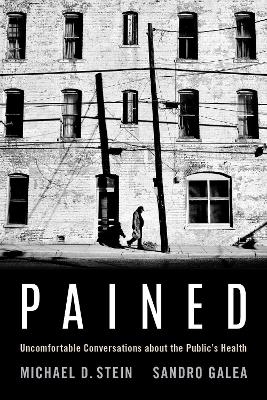
Pained
Oxford University Press Inc (Verlag)
978-0-19-751038-4 (ISBN)
Americans care about their health. Americans pay lots of money in hopes of maintaining their health. So why are Americans so unhealthy?
The reason is simple: as a country, the United States overinvests in medical care at the expense of the social, economic, and cultural forces that produce health. The rise of medicine as a cornerstone of American life and culture has coincided with a social and political devaluation of factors demonstrated to mean more to our vitality than anything else -- influences like where we live, work, and play; livable wages that create opportunity for healthy living; and gender and racial equity.
In Pained, physicians Michael Stein and Sandro Galea push the conversation around American health where it belongs: toward matters of class, money, and culture. Across more than 50 essays and data illustrations, Pained casts a light on how the structural components of everyday life -- like school, housing, police, even cell phones -- ultimately determine who gets to be healthy in today's America. In doing so, it makes a case for reframing our political discourse in less myopic, more effectual terms.
Accessible and surprising, political but not partisan, Pained is the urgent, uncomfortable conversation that American needs in this challenging moment. It will delight and infuriate readers of all political stripes.
MICHAEL STEIN is Professor and Chair of Health Law, Policy and Management of the School of Public Health at Boston University. He is primary care doctor and has been a leader in general medicine and substance use research and policy for two decades. He is Executive Editor of Public Health Post, a popular website on matters of population health. He is the author of six novels and two works of non-fiction. He has been interviewed by Terry Gross on NPR's Fresh Air and has been included in Best American Essays Notables. SANDRO GALEA is Robert A. Knox Professor and Dean of the School of Public Health at Boston University. He is a past president of the Society for Epidemiologic Research and of the Interdisciplinary Society for Population Health Science, chair of the board of the Association of Schools and Programs of Public Health, and is an elected member of the National Academy of Medicine.
Contents
Acknowledgments
Dedication
Preface
Section 1. THINKING DIFFERENTLY
1. Creating Health is Like Winning at Soccer
2. The Illusion of Clinical Success
3. Can We Reverse Course on Health?
4. A Party Trick
5. Treating Laura
6. Water Quality Violations
7. The Immigrant Experience in Hurricane Season
Section 2. THE PERSONAL IS POLITICAL
8. Denying Climate Change is Denying Health
9. Public Health and a President's Racism
10. The Census and Public Health
11. When We Talk About Public Health
12. The Two Degree Solution
13. The Partisan Divide Over a Soda Tax
Section 3. COUNTERINTUITIVE
14. What Kills Our Kids?
15. What Data Do We Need for Health?
16. We Cannot Have It All
17. The Microbiome and the Public's Health
18. Immigrants and Private Insurance: Pay More, Use Less
19. Dying Young in the USA
Section 4. A SURE ARGUMENT
20. Vaccines and Conspiracies
21. Health Systems and Public Health Thinking
22. Misconceptions about Veterans and Health
23. Immigration and the Health of the Public
24. Out of School, Out of Luck
25. Pseudoscience and Abortion Policy
Section 5. FOLLOW THE MONEY
26. Income Inequality and Our Health
27. Can CEOs Save the Health of Americans?
28. The Health of the Poorest 50%
29. Can We Promote Public Health and Generate Return on Our Investment?
30. The Poor People's Campaign
31. Spending Too Much On the Wrong Things
32. Clarifying Medical Bankruptcy
33. High Pay Gets Higher, Low Pay Gets Lower
Section 6. DARK THOUGHTS
34. The Story We Are Not Talking About Enough
35. Names Matter in the Opioid Epidemic
36. Pain Drain
37. Violence is a Public Health Issue
38. Mental Health and Mortality
39. Three Notes on the Opioid Crisis
40. Invest in Health, Not Death
41. Direct-to-Docs Opioid Marketing
42. Firearm Legislation Linked with Fewer Fatal Police Shootings
Section 7. THE FUNDAMENTALS
43. Housing and the Public's Health
44. Food Justice
45. Guns and Suicide
46. The Smoking Gap
47. Maybe the End of HIV
48. Homelessness
49. Documenting Delays in EMS Wait Times
50. Particular Particulates
Section 8. WILL TECHNOLOGY SAVE US?
51. Should Black Boxes Be Welcome in Medicine?
52. The New Elderly Surveillance State
53. Good App Hunting
54. In Social Media We Trust
55. Racial Equity in Kidney Transplants
56. Air Quality Standards Have Room to Improve
Section 9. WHAT NOBODY WANTS TO TALK ABOUT
57. Broken Justice and the Public's Health
58. The Promise of Palliative Care
59. Making Aging Healthier
60. The Downside of Drinking
61. How Far Do Women Have to Travel to Get an Abortion?
62. Planning for End-of-Life
Section 10. MAKING THINGS BETTER
63. Volunteering for the Health of the Public
64. Mental Health on Campus
65. Healthy Homes
66. Toward a Muscular Public Health
67. Zero Tolerance for Preventable Deaths
68. Police and the Public's Health
69. Making Strides Towards Zero
70. Cancer Survival Is (Mostly) Improving
Sources
| Erscheinungsdatum | 02.04.2020 |
|---|---|
| Verlagsort | New York |
| Sprache | englisch |
| Maße | 206 x 137 mm |
| Gewicht | 318 g |
| Themenwelt | Studium ► Querschnittsbereiche ► Prävention / Gesundheitsförderung |
| ISBN-10 | 0-19-751038-8 / 0197510388 |
| ISBN-13 | 978-0-19-751038-4 / 9780197510384 |
| Zustand | Neuware |
| Haben Sie eine Frage zum Produkt? |
aus dem Bereich


